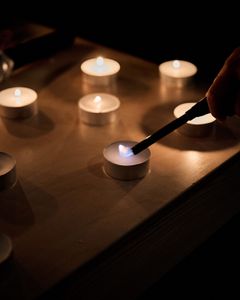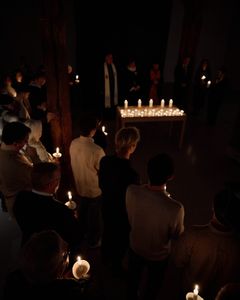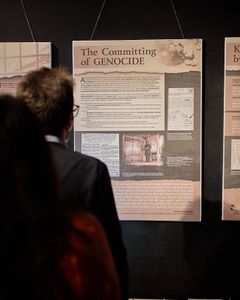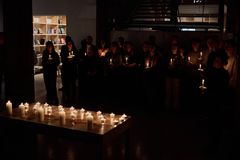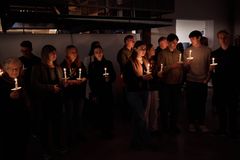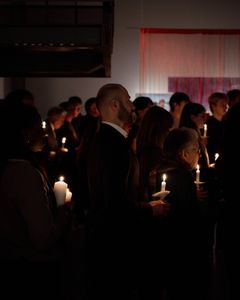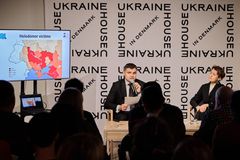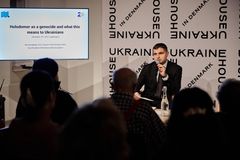Recognizing the Holodomor as genocide is a step to honor the memory of the victims – Dr. Horodyskyy
Dr. Ivan Horodyskyy, Vice-President of the Ukrainian Bar Association, appealed to the Danish parliament with a сordial request to make every effort to establish justice for the victims of the Holodomor by recognizing it as genocide. The expert spoke during the commemorative event “Holodomor – 90: impact on Ukraine and the future of justice” held at Ukraine House in Denmark on Nov. 25.
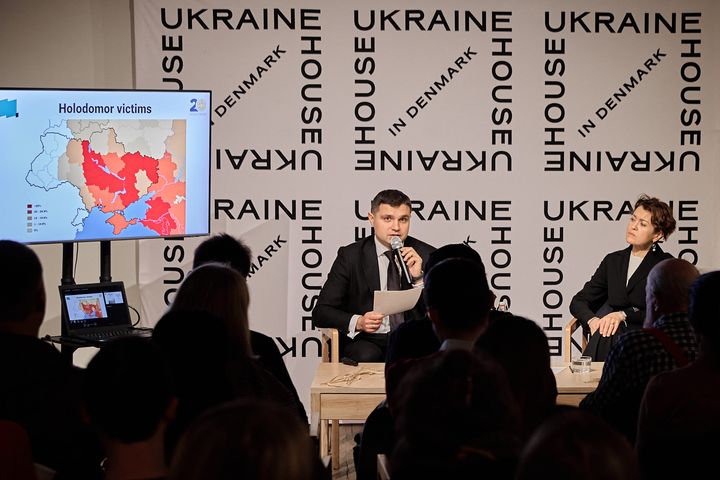
“For many Ukrainians, Denmark is the best example of what the idea of Europe is and should be. In Ukraine, they see and appreciate how unconditionally you supported us and your contribution to our struggle - from F-16 fighter jets to fresh water for the residents of front-line Mykolaiv… On behalf of the legal community of Ukraine, I appeal to our Danish friends with a request to make every effort to establish justice for the victims of the Holodomor by recognizing it as genocide,” said Dr. Horodyskyy.
He reminded the audience that during 1932-33 about 4 million Ukrainians became victims of the Holodomor genocide, the gravest crime recognised by international law. The victims of the Holodomor were killed not only because of their nationality, language or religion but also because of their desire to protect private property and have freedom of choice — the very values shared by Ukraine's modern-day allies. Unfortunately, 90 years later, this fact often is not enough for full worldwide recognition of this crime as genocide.
Dr. Horodyskyy said that from a legal standpoint, there are many challenges to the recognition of the Holodomor as a crime of genocide. However, he noted that many of the possible questions surrounding the recognition have been answered a long time ago.
On Dec. 9, the world will mark the anniversary of the adoption of the UN Convention on Genocide. Its co-author and creator of the crime's definition was Rafael Lemkin, a Second World War refugee and a thorough researcher of Nazi crimes.
Lemkin studied the legal system of the USSR and its criminal law. In 1953, he gave a speech to the Ukrainian diaspora in New York, the title of which was “Soviet Genocide in Ukraine," where he proclaimed that not only the Holodomor, but also the entire policy of the Soviet government aimed at destroying the identity of Ukrainians, was genocide.
In Dr. Horodyskyy’s opinion, Russia's aggression against Ukraine today is a continuation of its past practice of genocide in Ukraine – yet while it is clear that Holodomor of 1932-1933 was a genocide, it will take longer to gather evidence for Russia's current war against Ukraine and qualify it as genocide.
“The problem is that in 1948, different compromises were made and the Genocide Convention envisaged only physical genocide. Rafael Lemkin’s definition of genocide included notions that were broader and went beyond that of physical destruction. It included cultural genocide, social genocide, and many other types of genocide which we can see now in the temporary Russian-occupied territories of Ukraine,” explained Dr. Horodyskyy.
Photos: Alex Benes
For press inquiries, please contact Maya Zakhovaiko press@ukrainehouse.dk
Billeder
Følg pressemeddelelser fra Ukraine House in Denmark
Skriv dig op her, og modtag pressemeddelelser på e-mail. Indtast din e-mail, klik på abonner, og følg instruktionerne i den udsendte e-mail.
Flere pressemeddelelser fra Ukraine House in Denmark
Ukraine House in Denmark Hosts Chornobyl Legacy Discussion with Professor Serhii Plokhy7.5.2025 08:00:00 CEST | Press release
On Sunday, April 27, Ukraine House in Denmark had the honour of hosting a discussion dedicated to the legacy and present-day relevance of the Chornobyl disaster. We were privileged to welcome Professor Serhii Plokhii, Director of the Ukrainian Research Institute at Harvard University and a globally recognized authority on nuclear catastrophes. Professor Plokhii, who joined us at the opening of Ukraine House, opened by reminding us that “authoritarian regimes are there to create disasters—small disasters and big disasters—and Chornobyl is about a big disaster that can destroy life on Earth.” He went on to draw a chilling parallel between 1986 and 2022: “The most disturbing part of that new Chornobyl crisis that emerged in 2022 was that it was caused by the very same phenomenon—the authoritarian regime that has complete disregard for norms of international law, for human life, for environmental concerns.”
II Forum “Decolonizing Mindsets for Security in Europe” Calls for Urgent Cultural Reframing to Strengthen Democracy2.5.2025 08:00:00 CEST | Press release
On April 25, Ukraine House in Denmark hosted the second edition of the Forum “Decolonizing Mindsets for Security in Europe,” convening leading cultural and political thinkers to examine how colonial legacies shape memory, policy, and Europe’s security landscape. “At a time when cultural policy, memory, and history shape the global struggle for freedom and democracy, it's vital to reflect critically on the narratives that define how we see the US, Europe, Ukraine, and Russia. For Ukrainians, decolonisation means uncovering layers of russification and reclaiming our history, culture, and decision-making free from Russian-centric optics. But Ukraine’s security also depends on the willingness of democratic allies to emancipate themselves from cultural superpower biases—to recognise Ukrainian contributions to world heritage and engage with Ukraine as an equal partner in defending dignity and democracy. That’s why we will continue to foster dialogue around decolonizing mindsets—because only
Making Russia Pay – International Accountability Pathways to Justice discussed at Ukraine House Panel16.4.2025 08:01:53 CEST | Press release
As Russia’s war enters its third year, the question isn’t whether Ukraine will endure—but whether justice will. On April 9, Ukraine House in Denmark, in partnership with the Alliance of Democracies Foundation, convened a public discussion, “Establishing Accountability for Russia’s Actions in Ukraine”, with a sharp focus: how the world can make Russia pay—literally and legally—for its aggression. Featuring Jonas Parello-Plesner, Executive Director of the Alliance of Democracies Foundation, and Julia Kyrpa, Board Member of the Register of Damage for Ukraine (RD4U), the conversation illuminated a fast-moving and historic effort: building an international compensation system without Russia’s consent.
Panel Discussion: Establishing Accountability for Russia’s Actions in Ukraine2.4.2025 15:44:26 CEST | Press invitation
Copenhagen, Denmark – April 9, 2025 – As the world watches negotiations, ceasefires, and peace talks unfold, the reality on the ground in Ukraine remains stark. More than 180,000 documented war crimes, the forced deportation of at least 19,546 Ukrainian children, and relentless attacks on Ukrainian cities, homes, and infrastructure raise an urgent question: Can there be a just peace without full accountability?
II Decolonizing Mindsets for Security in Ukraine and Europe Forum26.3.2025 14:11:53 CET | Press invitation
Copenhagen, Denmark – April 25, 2025 – Ukraine House in Denmark invites to join us for a second edition of the Decolonizing Mindsets for Security in Europe Forum. In this iteration, the cultural dimension of decolonization will be in focus.
I vores nyhedsrum kan du læse alle vores pressemeddelelser, tilgå materiale i form af billeder og dokumenter samt finde vores kontaktoplysninger.
Besøg vores nyhedsrum
